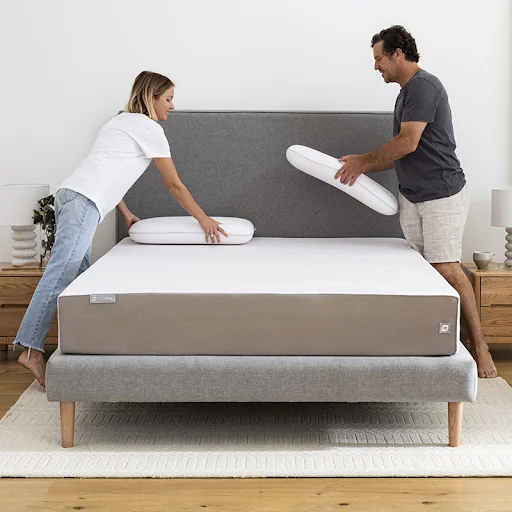Whether you’re deep in the backcountry or pitching a tent at your favorite campsite, one thing remains essential for an unforgettable adventure: quality sleep. While outdoor escapades are about rugged paths, breathtaking views, and escaping the daily grind, overlooking proper rest can transform your dream trip into a fatigue-fueled challenge. That’s why having the right sleep setup is as important as your gear or trail map. If you’re planning your next adventure, check out this 2025 best memory foam mattress guide to ensure your sleep system is ready for the wild.
The Connection Between Sleep and Outdoor Performance
When you’re hiking through uneven terrain, climbing, paddling, or even setting up camp, your body is in overdrive. Quality sleep is the body’s natural way of restoring muscles, balancing hormones, and preparing the mind for focus and endurance. Lack of proper rest can result in:
- Fatigue: Reduces your physical stamina and reaction time.
- Mood Swings: Sleep-deprived hikers often experience irritability or anxiety, dampening the joy of the experience.
- Weakened Immune Response: Your body is more vulnerable to illness or injury when sleep-deprived.
- Decreased Decision-Making: Navigating or dealing with emergencies in the wilderness requires clarity—something sleep directly affects.
Nature doesn’t always offer ideal sleeping conditions, but preparation can bridge the gap.
Common Sleep Challenges in the Wild
Even the most scenic spots can pose nighttime problems. Some common sleep disruptors include:
- Uncomfortable ground: Sleeping directly on hard or uneven surfaces can cause joint pain.
- Temperature fluctuations: Nights in the wild often drop well below daytime temperatures.
- Noise: From rustling animals to nearby campers, outdoor noises can interrupt sleep cycles.
- Light exposure: Sunrise or moonlight can disturb early-morning or middle-of-the-night rest.
- Mental overstimulation: The excitement of the trip can make it hard to wind down.
The right equipment and routine can help you overcome these.
How to Improve Your Outdoor Sleep Experience
1. Invest in Quality Sleep Gear
Your sleeping gear can make or break your outdoor experience. Here’s what should be in your sleep arsenal:
- Memory Foam Sleeping Pads or Mattresses: These provide excellent support and contour to your body, ensuring even pressure distribution.
- Insulated Sleeping Bags: Match your bag to the lowest expected nighttime temperature.
- Supportive Pillows: Inflatable or memory foam travel pillows add vital neck support.
- Tents with Proper Ventilation: Prevent moisture buildup and offer better airflow for uninterrupted sleep.
Consider compact, high-density foam mattresses that offer durability and warmth for multi-day hikes or camping. Memory foam is ideal for its adaptability and comfort, especially after physically demanding days.
2. Set Up a Strategic Camp
Where and how you set up camp also affects your sleep:
- Find level ground to avoid sliding or uneven pressure points.
- Choose shaded areas to reduce morning glare and regulate temperature.
- Avoid noisy spots like rivers or trail intersections.
- Use a ground tarp or footprint to insulate and protect your sleep surface.
A well-thought-out sleep site minimizes external disruptions and improves your sleep quality.
3. Establish a Bedtime Routine
Just because you’re off-grid doesn’t mean you should toss your sleep schedule. Your body relies on circadian rhythms. Here’s how to maintain them:
- Wind down 30 minutes before sleep: Stretching, reading, or journaling helps calm the mind.
- Avoid screens or bright lights (if you bring a device).
- Stick to regular sleep times: Try to sleep and wake around the same times daily.
- Limit caffeine or sugar intake late in the day.
These habits tell your body it’s time to rest, no matter where you are.
Digging into this topic? Here’s something else to explore.
4. Use Sleep Accessories
Some small accessories can make a big difference outdoors:
- Earplugs: Block out natural or human-made noises.
- Eye masks: Prevent moonlight or early sunlight from disturbing your sleep.
- Essential oils or balms: Lavender and eucalyptus promote relaxation.
- Compression blankets: Lightweight and cozy, they mimic the feel of your home bedding.
Being comfortable in your sleep environment helps you drift off faster and stay asleep longer.
Long-Term Benefits of Great Sleep Outdoors
Getting solid rest during your outdoor trips doesn’t just benefit your body for the day ahead—it creates long-term positive outcomes:
- Boosts cognitive resilience: Sleep helps lock in memories and improves emotional balance.
- Strengthens physical performance: Your muscles recover faster, and your endurance improves with proper sleep.
- Enhances the enjoyment: Well-rested adventurers are more present, alert, and able to appreciate nature fully.
- Reduces the risk of injury: Sleep supports motor coordination and response times, helping you avoid slips, trips, or poor choices.
In essence, great sleep turns a good outdoor trip into a fantastic one.
Final Thoughts
Exploring the outdoors is about connecting with nature, challenging yourself, and rejuvenating your spirit. But that’s hard to do when you’re exhausted, uncomfortable, or cranky from a sleepless night. By preparing for high-quality sleep just like you would for a long hike or tough climb, you’re setting the foundation for an adventure filled with energy, clarity, and joy.
Before your next trip, prioritize your sleep setup. Research the best gear, choose your campsite wisely, and give your body the rest it deserves. And don’t forget to consult the 2025 best memory foam mattress guide to find a sleep surface that meets your needs both on and off the trail.
Because in the wild, the best kind of adventure starts with a good night’s sleep.
Don’t miss our newest articles—they’re all waiting at 2A Magazine.







